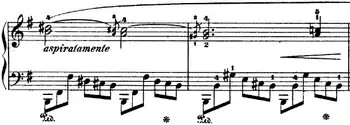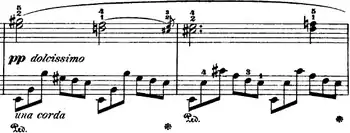
The Nocturne in E minor, Op. posth. 72 No. 1, WN 23, was composed by Frédéric Chopin for solo piano in 1826.[1] It was Chopin's first composed nocturne, although it was the nineteenth to be published, in 1855, along with two other early works: a funeral march in C minor and three écossaises. The composition features an unbroken line of quaver triplets in the left hand set against a slow melody of minims, crotchets, quaver duplets and triplets. It consists of 57 bars of common time with the tempo given as Andante, ![]() = 69 bpm.
= 69 bpm.
Background
According to Casimir Wierzyknski, in his book The Life and Death of Chopin, "up until then this form [the nocturne] had been the exclusive domain of John Field, an Irish-born composer. But his Nocturne in E minor did not satisfy him [Chopin] and was published only posthumously."
Form

An informal analysis of the piece is as follows:
- Bar 1: Introduction, first subject.
- Bar 2–9: Theme A, in E minor.
- Bar 10–17: Variation on theme A, beginning with octaves in the right hand.
- Bar 18–22: Interlude
- Bar 23–30: Theme B, in B major, consisting of a four bar phrase, repeated with variation, second subject.
- Bar 31–38: Heavily ornamented variation on A, in E minor, first subject again.
- Bar 39–46: Variation on theme A, beginning with octaves in the right hand.
- Bar 47–54: Theme B, modulated to E major, second subject again.
- Bar 55–57: Coda in E major.

Use in modern culture
This piece was played by the actor Jeri Ryan while portraying Seven of Nine at the beginning of the Star Trek: Voyager episode "Human Error". The piece was also performed by Doc Holiday in the 1993 movie Tombstone and was used as the main theme in The Secret Garden (1987).
References
- ↑ Numbering and Chronology of the Works Published After Chopin's Death (PDF) (Chopin National ed.).
External links
- Nocturnes Op. Posth. 72: Scores at the International Music Score Library Project
- Free sheet music of Nocturne in E minor from Cantorion.org
- Recording at musopen.com